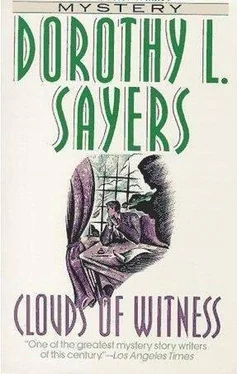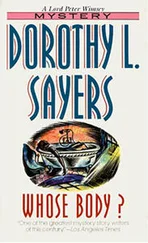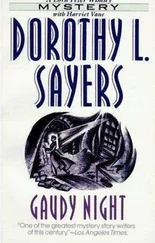Dorothy Sayers - Clouds of Witness
Здесь есть возможность читать онлайн «Dorothy Sayers - Clouds of Witness» — ознакомительный отрывок электронной книги совершенно бесплатно, а после прочтения отрывка купить полную версию. В некоторых случаях можно слушать аудио, скачать через торрент в формате fb2 и присутствует краткое содержание. Жанр: Классический детектив, на английском языке. Описание произведения, (предисловие) а так же отзывы посетителей доступны на портале библиотеки ЛибКат.
- Название:Clouds of Witness
- Автор:
- Жанр:
- Год:неизвестен
- ISBN:нет данных
- Рейтинг книги:4 / 5. Голосов: 1
-
Избранное:Добавить в избранное
- Отзывы:
-
Ваша оценка:
- 80
- 1
- 2
- 3
- 4
- 5
Clouds of Witness: краткое содержание, описание и аннотация
Предлагаем к чтению аннотацию, описание, краткое содержание или предисловие (зависит от того, что написал сам автор книги «Clouds of Witness»). Если вы не нашли необходимую информацию о книге — напишите в комментариях, мы постараемся отыскать её.
Clouds of Witness — читать онлайн ознакомительный отрывок
Ниже представлен текст книги, разбитый по страницам. Система сохранения места последней прочитанной страницы, позволяет с удобством читать онлайн бесплатно книгу «Clouds of Witness», без необходимости каждый раз заново искать на чём Вы остановились. Поставьте закладку, и сможете в любой момент перейти на страницу, на которой закончили чтение.
Интервал:
Закладка:
"So Cathcart rushes out into the garden. In the pelting rain he paces heedlessly about, envisaging a future stricken at once suddenly barren of love, wealth, and honour.
"And, meanwhile, a passage door opens, and a stealthy foot creeps down the stair. We know now whose it is-Mrs. Pettigrew-Robinson has not mistaken the creak of the door. It is the Duke of Denver.
"That is admitted. But from this point we join issue with my learned friend for the prosecution. It is suggested that the Duke, on thinking matters over, determines that Cathcart is a danger to society and better dead-or that his insult to the Denver family can only be washed out in blood. And we are invited to believe that the Duke creeps downstairs, fetches his revolver from the study table, and prowls out into the night to find Cathcart and make away with him in cold blood.
"My lords, is it necessary for me to point out the inherent absurdity of this suggestion? What conceivable reason could the Duke of Denver have for killing, in this cold-blooded manner, a man of whom a single word has rid him already and for ever? It has been suggested to you that the injury had grown greater in the Duke's mind by brooding-had assumed gigantic proportions. Of that suggestion, my lords, I can only say that a more flimsy pretext for fixing an impulse to murder upon the shoulders of an innocent man was never devised, even by the ingenuity of an advocate. I will not waste my time or insult you by arguing about it. Again it has been suggested that the cause of quarrel was not what it appeared, and the Duke had reason to fear some disastrous action on Cathcart's part. Of this contention I think we have already disposed; it is an assumption constructed in vacua , to meet a set of circumstances which my learned friend is at a loss to explain in conformity with the known facts. The very number and variety of motives suggested by the prosecution is proof that they are aware of the weakness of their own case. Frantically they cast about for any sort of explanation to give colour to this unreasonable indictment.
"And here I will direct your lordships' attention to the very important evidence of Inspector Parker in the matter of the study window. He has told you that it was forced from outside by the latch being slipped back with a knife. If it was the Duke of Denver, who was in the study at 11.30, what need had he to force the window? He was already inside the house. When, in addition, we find that Cathcart had in his pocket a knife, and that there are scratches upon the blade such as might come from forcing back a metal catch, it surely becomes evident that not the Duke, but Cathcart himself forced the window and crept in for the pistol, not knowing that the conservatory door had been left open for him.
"But there is no need to labour this point-we know that Captain Cathcart was in the study at that time, for we have seen in evidence the sheet of blotting-paper on which he blotted his letter to Simone Vonderaa, and Lord Peter Wimsey has told us how he himself removed that sheet from the study blotting-pad a few days after Cathcart's death.
"And let me here draw your attention to the significance of one point in the evidence. The Duke of Denver has told us that he saw the revolver in his drawer a short time before the fatal 13 th, when he and Cathcart were together."
The Lord High Steward: "One moment, Sir Impey, that is not quite as I have it in my notes."
Counsel: "I beg your lordship's pardon if I am wrong."
L.H.S.: "I will read what I have. 'I was hunting for an old photograph of Mary to give Cathcart, and that was how I came across it.' There is nothing about Cathcart being there."
Counsel: "If your lordship will read the next sentence-"
L.H.S.: "Certainly. The next sentence is: 'I remember saying at the time how rusty it was getting.'"
Counsel: "And the next?"
L.H.S.: "' To whom did you make that observation?' Answer: 'I really don't know, but I distinctly remember saying it.'"
Counsel: "I am much obliged to your lordship. When the noble peer made that remark he was looking out some photographs to give to Captain Cathcart. I think we may reasonably infer that the remark was made to the deceased."
L.H.S. (to the House): "My lords, your lordships will, of course, use your own judgment as to the value of this suggestion."
Counsel: "If your lordships can accept that Denis Cathcart may have known of the existence of the revolver, it is immaterial, at what exact moment he saw it. As you have heard, the table-drawer was always left with the key in it. He might have seen it himself at any time, when searching for an envelope or sealing-wax or what not. In any case, I contend that the movements heard by Colonel and Mrs. Marchbanks on Wednesday night were those of Denis Cathcart. While he was writing his farewell letter, perhaps with the pistol before him on the table-yes, at that very moment the Duke of Denver slipped down the stairs and out through the conservatory door. Here is the incredible part of this affair-that again and again we find two series of events, wholly unconnected between themselves, converging upon the same point of time, and causing endless confusion. I have used the word 'incredible'-not because any coincidence is incredible, for we see more remarkable examples every day of our lives than any writer of fiction would dare to invent-but merely in order to take it out of the mouth of the learned Attorney-General, who is preparing to make it return, boomerang-fashion, against me. (Laughter.)
"My lords, this is the first of these incredible-I am not afraid of the word-coincidences. At 11.30 the Duke goes downstairs and Cathcart enters the study. The learned Attorney-General, in his cross-examination of my noble client, very justifiably made what capital he could out of the discrepancy between witness's statement at the inquest-which was that he did not leave the house till 2.30-and his present statement-that he left it at half-past eleven. My lords, whatever interpretation you like to place upon the motives of the noble Duke in so doing, I must remind you once more that at the time when that first statement was made everybody supposed that the shot had been fired at three o'clock, and that the misstatement was then useless for the purpose of establishing an alibi.
"Great stress, too, has been laid on the noble Duke's inability to establish this alibi for the hours from 11.30 to 3 A.M. But, my lords, if he is telling the truth in saying that he walked all that time upon the moors without meeting anyone, what alibi could he establish? He is not bound to supply a motive for all his minor actions during the twenty-four hours. No rebutting evidence has been brought to discredit his story. And it is perfectly reasonable that, unable to sleep after the scene with Cathcart, he should go for a walk to calm himself down.
"Meanwhile, Cathcart has finished his letter and tossed it into the post-bag. There is nothing more ironical in the whole of this case than that letter. While the body of a murdered man lay stark upon the threshold, and detectives and doctors searched everywhere for clues, the normal routine of an ordinary English household went, unquestioned, on. That letter, which contained the whole story, lay undisturbed in the postbag, till it was taken away and put in the post as a matter of course, to be fetched back again, at enormous cost, delay, and risk of life, two months later in vindication of the great English motto: 'Business as usual.'
"Upstairs, Lady Mary Wimsey was packing her suitcase and writing a farewell letter to her people. At length Cathcart signs his name; he takes up the revolver and hurries out into the shrubbery. Still he paces up and down, with what thoughts God alone knows-reviewing the past, no doubt, racked with vain remorse, most of all, bitter against the woman who has ruined him. He bethinks him of the little love-token, the platinum-and-diamond cat which his mistress gave him for good luck! At any rate, he will not die with that pressing upon his heart. With a furious gesture he hurls it far from him. He puts the pistol to his head.
Читать дальшеИнтервал:
Закладка:
Похожие книги на «Clouds of Witness»
Представляем Вашему вниманию похожие книги на «Clouds of Witness» списком для выбора. Мы отобрали схожую по названию и смыслу литературу в надежде предоставить читателям больше вариантов отыскать новые, интересные, ещё непрочитанные произведения.
Обсуждение, отзывы о книге «Clouds of Witness» и просто собственные мнения читателей. Оставьте ваши комментарии, напишите, что Вы думаете о произведении, его смысле или главных героях. Укажите что конкретно понравилось, а что нет, и почему Вы так считаете.












